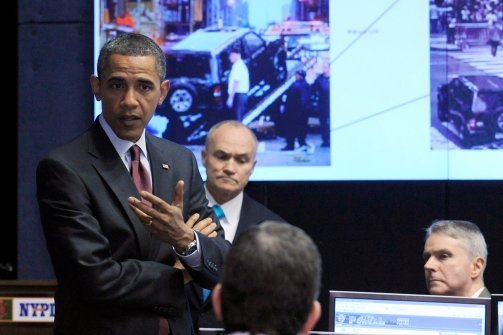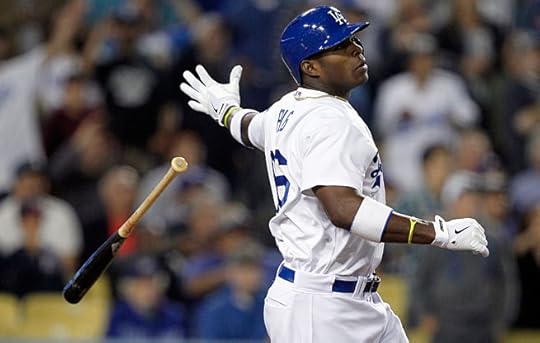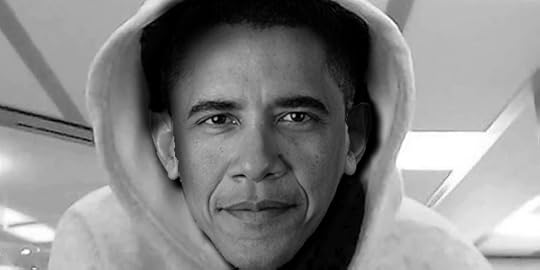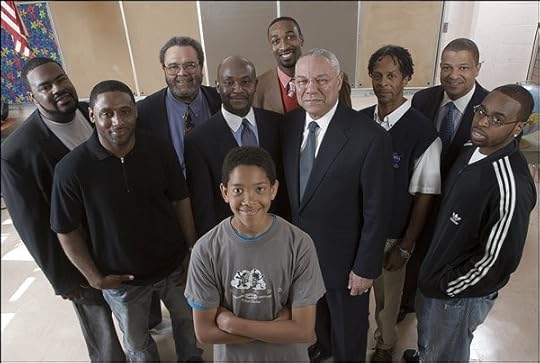Mark Anthony Neal's Blog, page 880
July 25, 2013
HuffPost Live: Should Spike Lee Crowdfund His Next Film?
Spike Lee is the latest millionaire celeb to fund his next film on Kickstarter. Unlike typical film investors, Kickstarter backers get no cut of the profits. Why all this digital panhandling? Why shouldn't superstar filmmakers pay their backers back?
Hosted by:
Josh ZeppsGuests:
Byron Hurt @byronhurt (Plainfield , NJ) Award-winning Filmmaker & Activist; Filmmaker, Soul Food JunkiesDan Mirvish @DanMirvish (Los Angeles, CA) Director, Screenwriter & AuthorLili Balfour @atelieradvisors (San Francisco, CA) Founder and CEO of Atelier AdvisorsThor Jensen @kthorjensen (San Diego, CA) Senior Writer for Guyism.comKen Levine @kenlevine (Los Angeles , CA) Emmy Winning TV Comedy Writer
Published on July 25, 2013 12:48
July 24, 2013
Commemorating 50 Years of Inclusion?: Reflections from Duke University's D.C.-based Black Alumni
Published on July 24, 2013 09:29
Beyond a Lunchbox to the Head: President Obama and the Embrace of Trayvon Martin by David Wall Rice
 Beyond a Lunchbox to the Head: President Obama and the Embrace of Trayvon Martin
by David Wall Rice |
HuffPost Black Voices
Beyond a Lunchbox to the Head: President Obama and the Embrace of Trayvon Martin
by David Wall Rice |
HuffPost Black Voices
I have a friend – family really – who attended Key Elementary with me in Arlington, Texas. I'd been at the school for about a year before she showed up. I lived in Los Angeles before moving to Texas.
Each morning at Key, before classes began, we would line up and then properly proceed into our homerooms. I was in the 4th grade. The line-up had become tricky for me. It was a time when older kids would pick on me, calling me – the black kid from Cali who oddly fit into the South–“ni—er ." This necessitated my fighting the bullies, and then being disciplined, and then explaining things to my mom over, and over, and over again. The teachers knew the deal, the administrators at the school where aware, other kids were with me, my mom had my back, still, no matter, I was an exhausted little dude. I was solo in my fight.
But then, one morning in line, my friend was there. She was from Harlem. She was fresh to the school, a newbie who needed my support and protection. While in the line I saw the 6th grader coming up to us. He was a white boy who I'd put paws on before. I was bracing myself to fight again. He walked up, contorted his face and fixed his lips, but before he could give the "n-word" slur his full throat, my friend smashed him on the side of the head with her metal lunch box. The boy was shook, but fine. My friend was still screaming on the kid when teachers, or whoever, took her to the office. The boom from the box-to-head got everyone's attention.
It was amazing. I had a comrade in the fight with me. I was not alone. My struggle was cosigned.
Shortly after President Obama's surprise comments in the White House press pool reacting to the Zimmerman acquittal, I went back and forth with my friend a bit about what the president said. The balance of her reaction was, "it's a start." And I agree.
However brilliant the president's words were in reaction to the tragedy of Trayvon Martin, and however deft his balance of social commentary with policy, with the power of his personal narrative, it was still a start. It was a good start, his metaphorical metal lunch box to the head of our collective consciousness on issues of institutional and cultural racism.
The gravity of the president explaining his personal connection to the criminalization of black men cannot be overstated. His "Trayvon Martin could have been me," was great. President Obama, in his remarks, cosigned my struggle. He referenced an important history of injustice for black people in this country that has metastasized to present policies and socio-cultural realities that remain barriers to a full realization of The Great Experiment for black people.
There is a present, however, that we have to press. Indeed, President Obama cosigned my struggle, but he also compounds it with his consideration of NYPD Police commissioner Raymond Kelly -- Officer Stop and Frisk more black people – as the head of Homeland Security, and in implementing other domestic policies that cripple black men and boys.
The sense-making in politics can be baffling.
The president's remarks were important. They were historic. But there is still extension needed to this start of his. There is a mountain to climb regarding the relentless marginalizing of black men and black boys that is cyclical between popular culture, everyday practice and policy.
My friend hitting that 6th grader in the head with her lunch box, and me fighting all the time in elementary school did not solve our problem. Truth be told, our mothers moved us to a different school where we thrived. But that action, that jolting response to normed racist behavior was a start. It helped us to redefine our situation in a way that helped us to move beyond it. I pray the same will be said of this watershed moment in Mr. Obama's presidency, and that this will be a significant move to justice for Trayvon Martin and too many other black boys and men.
Follow David Wall Rice on Twitter: www.twitter.com/dwallrice
***
David Wall Rice is Department Chair and Associate Professor of Psychology at Morehouse College. He is also Principal Investigator of the Identity Orchestration Research Lab (IORL). IORL explores expressions of identity balance through engagement, the exploration of varied contexts and personal narratives. It is a strengths-based lab that works to understand and to elicit behavioral bests.
Published on July 24, 2013 08:55
July 23, 2013
Are African-American Men 'Invisible?'
Published on July 23, 2013 20:15
Detroit Goes Bankrupt: Will Unelected Manager Pit City's Needs Against Rights of Pensioners?
Democracy Now
Facing an estimated $18 billion in debt, Detroit has become the largest U.S. municipality to file for bankruptcy. It is a grim milestone in the decline of what was once the country's fourth largest city. Known as the Motor City and the birthplace of the middle class, Detroit's auto industry and manufacturing sector have collapsed. A steady decline in population has decimated its tax base, leaving the city with massive cuts to basic services and one of the nation's highest rates of violent crime. The Chapter 9 bankruptcy filing has set off what could be a prolonged legal battle with thousands of current and former city employees entitled to pensions and medical benefits. Detroit's unelected Emergency Manager has said that cutting pensions will be vital to restoring basic services that have shrunk with the decline of city revenues over the years. We're joined by Mark Binelli, author of "Detroit City Is the Place to Be: The Afterlife of an American Metropolis."
Published on July 23, 2013 20:01
"Little Black Boy Wonder"--Black Actors Salute the Memory of Trayvon Martin
TRAYVON MARTIN Dedication
Written and Produced by Omari Hardwick.Directed by Mo McRae.
Featuring: Aaron D Spears, Affion Crockett, Bill Duke, Brian Dobbins, David Oweloyo, Eriq LaSalle, Gary Dourdan, Isaiah Roberts, Jay Ellis, Marlon Wayans, Mo McRae, Omar Benson Miller, Omari Hardwick, Robbie Jones, Pastor Toure Roberts, Sugar Shane Mosely,Wesley Jonathan, and Wren Brown.
Published on July 23, 2013 09:50
The Left of Black Summer Special | Talking Racial Stereotypes and Dance with Camille A. Brown at the American Dance Festival
The 'Left of Black' Summer Special | Talking Racial Stereotypes and Dance with Camille A. Brown at the American Dance Festival
Host and Duke University Professor Mark Anthony Neal sits down with dancer and choreographer Camille A. Brownin the Left of Black studios to discuss her latest work Mr. TOL E. RAncE , which was performed at the American Dance Festival in Durham, North Carolina. Mr. TOL E. RAncEexamines the impact of racial stereotypes from the era of Blackface minstrelsy to contemporary Reality Television.
Camille A. Brown is a prolific choreographer who has achieved multiple accolades and awards for her daring works. Ms. Brown is the 2013 recipient of The International Association of Blacks in Dance Founders Award, winner of the prestigious Princess Grace Award (Choreography), the Mariam McGlone Emerging Choreographer Award (Wesleyan University), and the 2012 City College of New York Women & Culture Award. The artistic director of Camille A. Brown and Dancers , Ms. Brown was choreographer for the Broadway revival of A Streetcar Named Desire in 2012. A new musical, Fortress of Solitude, also featuring her choreography, is slated to debut at the Public Theater in 2014.
***
Left of Black is a weekly Webcast hosted by Mark Anthony Neal and produced in collaboration with the John Hope Franklin Center at Duke University.
*** Episodes of Left of Black are also available for free download in @ iTunes U
Published on July 23, 2013 04:31
How I Roll: Yasiel Puig and Afro-Cuban Identity by Simone Drake
 How I Roll: Yasiel Puig and Afro-Cuban Identity
by Simone Drake | special to NewBlackMan (in Exile)
How I Roll: Yasiel Puig and Afro-Cuban Identity
by Simone Drake | special to NewBlackMan (in Exile)Admittedly, I am not a sports fan. I played sports throughout my youth and for a period in college, but I have never enjoyed watching others play much. I am, however, often subjected to ESPN Sports Center and other radio sports programs when riding in the car with my husband, and I consistently find the racial narratives embedded in, and sometimes addressed directly in, the commentary far more interesting than the sports themselves.
My introduction to Yasiel Puig is no different. As I sat listening to the litany of complaints against this young, Cuban-American, Los Angeles Dodgers rookie, I stopped planning out how to successfully put all three of my kids to bed early that evening, and I began listening to ESPN’s coverage of all the drama that apparently erupted only one month after his MLB debut. Basically, the media and a fair share of MLB opponents have complained that Puig won’t play by their rules: he has not shown reverence to league giants; he will not make his private life public; he has an arrogant “swagger” on and off the field; and he has used his interpreter to try to pick up women. Both his fans and teammates, however, seem to have few complaints and lots of adoration.
I interpreted all of this as the media wanting a “salvation” story—wanting to know that the U.S., who has had an imperialist relationship with Cuba, has saved a poor, black Cuban from socialism and allowed him to experience capitalism. The insistence by the media on being able to tell Puig’s story, or to usurp his self-pimping for their own benefit, produces a troubling, yet all too familiar race narrative. In his debut month, Puig batted .436 with seven home runs and 16 RBIs, with no debut being so prolific since Joe DiMaggio in 1936. The media has subsequently complained about Puig’s insistence on keeping his private life and past separate from his public life as a rising baseball star.
Various MLB players, including the Arizona Diamondback’s, Miguel Montero, have complained that Puig is arrogant and needs to be more humble and respect the game, which Montero emphasizes when he claims Puig creates a bad reputation around the league by going out there with all that “swagger” and “making people want to crush him.” Fans, on the other hand, generally seem much more concerned about the athletic performance of No. 66 and feel an intimacy with him through his athleticism rather than through a personal narrative of struggle and determination.
In response to the criticism, Puig has largely remained silent. He has not invited Oprah to convene a special show for him to breakdown and sob, telling a story of a poor black boy trying to repeatedly defect from Cuba. Instead, he has said he no longer pays attention to what the press writes, and that he does not like the press. In a July 7, 2013 interview, he bluntly states, "I don't like to be interviewed so often, because the accomplishments are not just mine but the whole team's. It's nine of us giving our best on the field, and my teammates also deserve to be asked questions." It is interesting that his opponents find someone who emphasizes the sport being a team sport and shirking individual recognition to be arrogant.
At this point, no one can say for certain whether Puig’s performance will sustain and grow, or if it will fizzle. What can be said, however, is that even without mentioning Puig’s Afro-Cuban ethnicity, a narrative of race and nation is festering in the media coverage of this phenom. Unlike the initial wave of fair-skinned, or “white,” middle and upper middle class defectors who fled Cuba after the Cuban Revolution and Fidel Castro displaced Fulgencio Batista, Puig represents the dually oppressed black population whose disproportionate representation in the Cuban refugee and emigrant population in the U.S. was staggeringly low until the 1980 Mariel boatlift. Once a critical mass of Afro-Cubans did begin arriving in the U.S., they often did not have the social capital of the first and second wave of primarily “white” immigrants, and their identifiable blackness made them unwelcome in established Cuban communities in the U.S. and especially in Miami. Furthermore, the fact that they were not allotted the same residential status and Federal benefits as the previous two waves of immigrants created serious economic, social, and political challenges for the high number of black Cubans arriving in 1980.
This history seems to inform perceptions of how Puig should and should not interact with the media, and ultimately, how he ought to perform gratitude for being saved from a life that, while as a player on a Cuban national baseball team was more comfortable than that of the average Cuban, is nothing compared to his life in the U.S.
The racial undertones of the coverage of Puig’s debut are poignantly summarized in a USA Today article, describing Puig as, “a burgeoning legend without a past.” As a population who dominates in number—depending on how you define “white”—Afro-Cubans are under-represented in the Cuban government and have virtually no presence in higher education institutions. Although an African heritage heavily informs Cuban culture, that African past and the black and mixed-race population produced by it are largely written out of the national narrative both in Cuba and the United States.
I doubt, however, that the media pesters Puig for his story because they want to participate in recovering an obscured African past, which could be why Puig drives his white Rolls Royce, conjuring Don Omar’s “How We Roll,” as his silence and curt responses, or as Montero labels it, “swagger,” insinuate: “And we do it how we do it whether it's now or it's later/And we always handle business cause we bout gettin this paper/What you want, what you need…” Puig is just handling his business, and I, for one, do not begrudge him his privacy.
***
Simone Drake is an assistant professor of African American and African Studies at The Ohio State University. Her research interests are broad and interdisciplinary, focusing on: critical race, gender, and legal studies; transnational black feminism; black masculinities; visual and popular culture; and the literature of the African Diaspora in the Americas. Many of these research areas intersect in Drake’s forthcoming Transnational Negotiations: Critical Appropriations in Black Women’s Cultural Productions (LSU Press), and in her second project, When We Imagine Grace: Black Men and Subject Making.
Published on July 23, 2013 03:32
July 22, 2013
Keli Goff & Mark Anthony Neal Talk POTUS and Racial Profiling on Minnesota Public Radio

The Daily Circuit | Minnesota Public Radio
President's Remarks Made it Clear: Black People aren't Paranoid
Keli Goff: Political correspondent for The Root and author, "The GQ Candidate"Mark Anthony Neal: Professor, African and African American Studies, Duke University***President Barack Obama's first extended comments Friday about the verdict in the George Zimmerman trial were significant because they validated African-Americans' claims of widespread profiling, according to guests interviewed on the Daily Circuit.Kelli Goff, a columnist for The Root, said her white friends seem to think that such perceptions result from paranoia, not reality.On Friday, Obama said African-Americans might have reacted as they did to the confrontation between George Zimmerman and Trayvon Martin because they know what it's like to be followed through a store, or to hear car doors being locked when they approach. "That includes me," he said. "Those sets of experiences inform how the African-American community interprets what happened one night in Florida.""There were a lot of people who heard him give those remarks whose reaction was, 'That has happened to the president?' And that's why it was significant," Goff said. "There were a lot of people ... who thought there was a measure of paranoia that we as African-Americans were operating under in reaction to the verdict and in reaction to the events that night."And when the president of the United States says, 'I had to become a senator to stop being followed around in department stores,' it recognizes racial profiling not as an African-American problem but as an American problem."And many black Americans had been waiting impatiently for Obama to make such remarks, said Mark Anthony Neal, a professor at Duke University."I don't think Tavis Smiley was wrong necessarily when he said that the president was shoved to the podium on Friday in order to make this statement," Neal said. "I think he was also partially shoved by the women he shares the house with."
Published on July 22, 2013 14:37
Jasiri X: "Blood on the Leaves" (Remix)
Jasiri X | "Blood on the Leaves" (Remix)
LYRICS
Only white life is protected in America
Every Black life is rejected till they bury ya
1000 Blacks killed it's expected the more the merrier
1 white child gets murdered it's mass hysteria
2 white kids killed that's way beyond the limits
3 white kids killed now that's a damn epidemic
The President on tv crying and looking tore up
500 Blacks die we dont even expect him to show up
You know what if you know us what's sad but so true to
Is we probably hate Black people more than you do
Racists taught the basis if hatred was our faces
We take gages and spray it attempting to erases it
Blood on the pavement no saving no statements no detainment no arraignment no ability to change it
In death we become famous
Our portraits are painted with no gallerys to hang em
So t-shirts are created
But after 3 washes those images get faded
Now we need a new plantiff whose death was so flagrant
To become our new favorite
And distract from the fact we in gally of a slave ship getting beat by the same whip
No matter how you frame it
Nigga is such powerful word in any language now let me explain it
Cause everybody saying it has helped to make us aimless living with anguish and Black Death painless
Internalized hatred once murdered we lie naked then evolved into unsolved cases
We revolve into steel wall cages and languish until ancient
Then released into the matrix as unqualified vagrants
Sidewalks stained by what remains of the nameless
Forever tainted by the veins which sprayed it until they fainted
There's nothing more dangerous
Than the life of a young Black male the scales weighted our murder's premeditated
Imagine a forth grade kid taking a test
And on the outcome they base an arrest
Young man can you out run the faces of death race with a tec
They tightening the rope till it's breaking ya neck
We got so many Trayvons we need God to give us a groupon
One day after the verdict we still getting our shoot on
Rappers still promoting Black death getting they loot on
Corporations got em enslaved it's just a new form
A Black woman's holding her to a Black boy a new born
Who's gonna look him dead in his eye and tell him his hues wrong
Hold still little man let America put this noose on
And hang you from the highest tree branch another youth gone
Published on July 22, 2013 14:14
Mark Anthony Neal's Blog
- Mark Anthony Neal's profile
- 30 followers
Mark Anthony Neal isn't a Goodreads Author
(yet),
but they
do have a blog,
so here are some recent posts imported from
their feed.




